What you drink during pregnancy is just as important as what you eat when it comes to the development of your kid. Staying hydrated is especially crucial during pregnancy because of the increased demands placed on both you and the developing baby. Here are some detail about Water How Much Should I Drink While Pregnant Calculator?
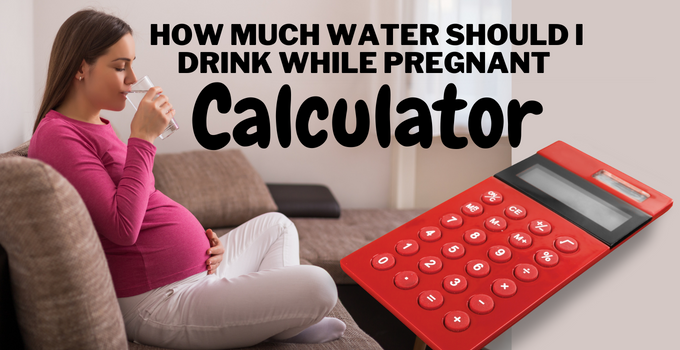
How much water should I drink while pregnant? Eight to twelve cups (64 to 96 ounces) of water per day is recommended during pregnancy. Numerous advantages may be gained from drinking water. It helps break down food and contributes to amniotic fluid production surrounding the developing baby. Water also aids in the transportation of nutrients throughout the body and the elimination of metabolic waste.
Pregnancy Water Intake Calculator
| Image | Product | Details | Coupon Code | Price |
|---|---|---|---|---|
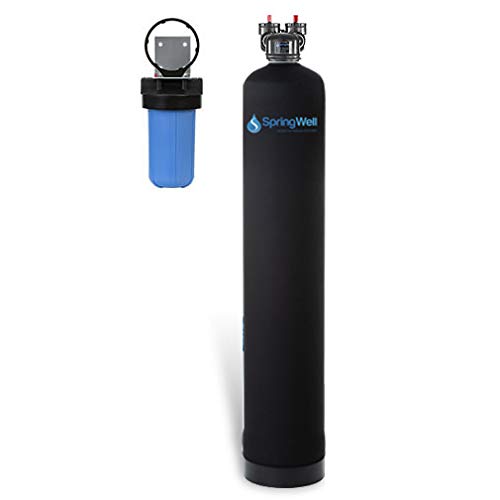 |
SALT-BASED WATER SOFTENER Springwell Water Whole House |
Type: Ion Exchange Grain Capacity: 32,000 – 80,000 grains Flow Rate: 11 – 20 GPM Warranty: Lifetime |
MHWT5 | Check Price |
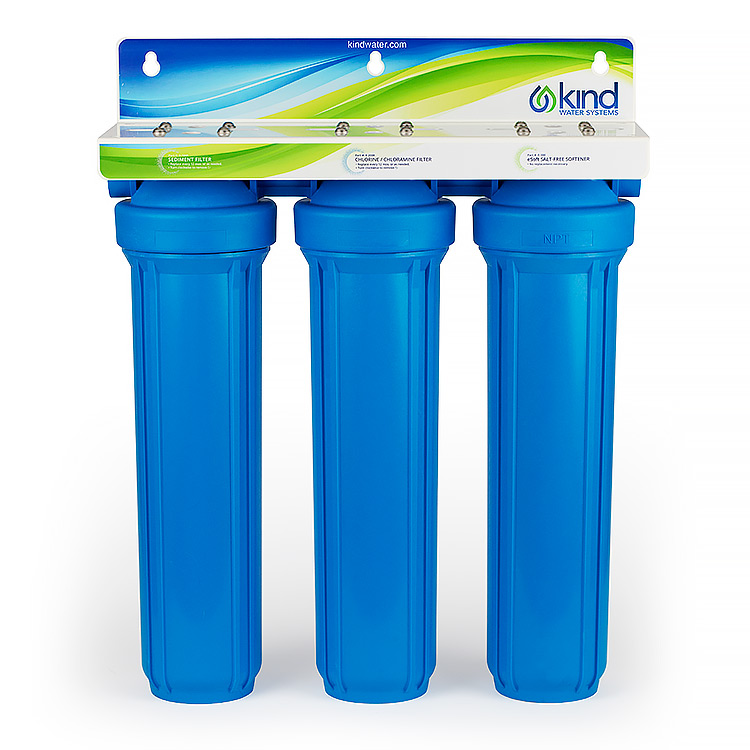 |
SALT-FREE WATER SOFTENER Kind Water Systems Whole House |
Type: Template Assisted Crystallization Grain Capacity: N/A Flow Rate: 15 GPM Warranty: Lifetime |
MHWT5 | Check Price |
Note: 1 Kg = 2.2 lbs
To help you determine how much water you need to drink each day, we’ve included a handy calculator below that takes into account your weight among other variables.
Table of Contents
Benefits of drinking a good amount of water during pregnancy
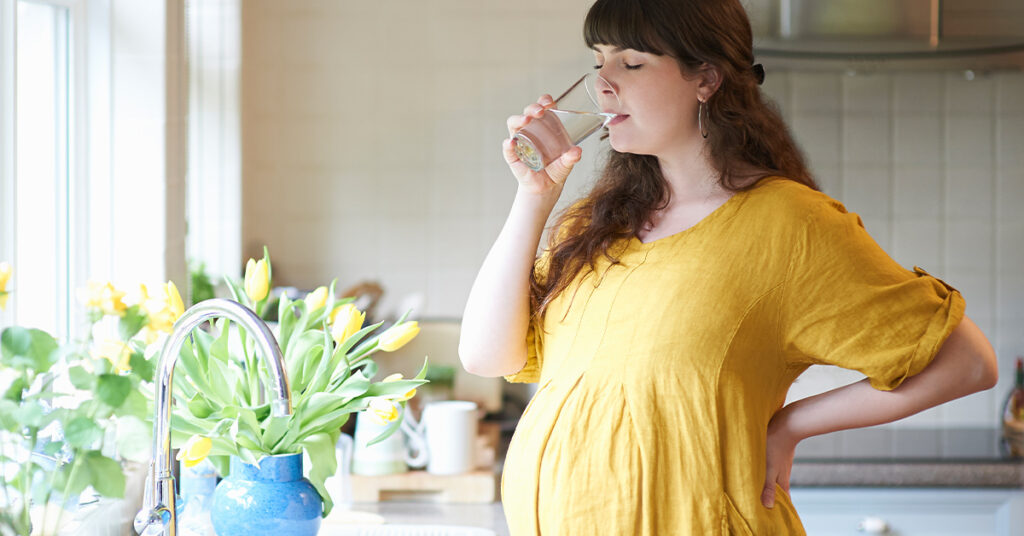
One of the easiest things you can do for a healthy pregnancy is to drink water throughout the day. This is since maintaining a healthy water intake has been linked to several positive effects on human health.
Provides structural support for your body.
About three-quarters of your body is water, and that water plays an important role in digesting, maintaining a steady internal temperature, and manufacturing hormones, among many other things.
Maintains your health during pregnancy.
During pregnancy, your blood volume and metabolic rate both rise dramatically, both of which necessitate an increased intake of water (which supplies your baby with the oxygen and nutrients he needs to grow).
The edema is decreased.

Your feet and ankles may swell due to dehydration. Because your body stores extra water if it thinks it’s losing out on fluids, dehydration can lead to fluid retention. (Excessive or abrupt swelling, especially in the hands, legs, or face, should prompt you to seek medical attention, as it may be an indication of preeclampsia.)
Ensures regular bowel movements.
Constipation and hemorrhoids are two of the most frequent issues pregnant women face, but drinking enough fluids can help alleviate both.
UTIs are reduced.
Water helps prevent UTIs and bladder infections because it dilutes urine and encourages frequent urination, both of which wash away germs.
How much water should I drink while pregnant?
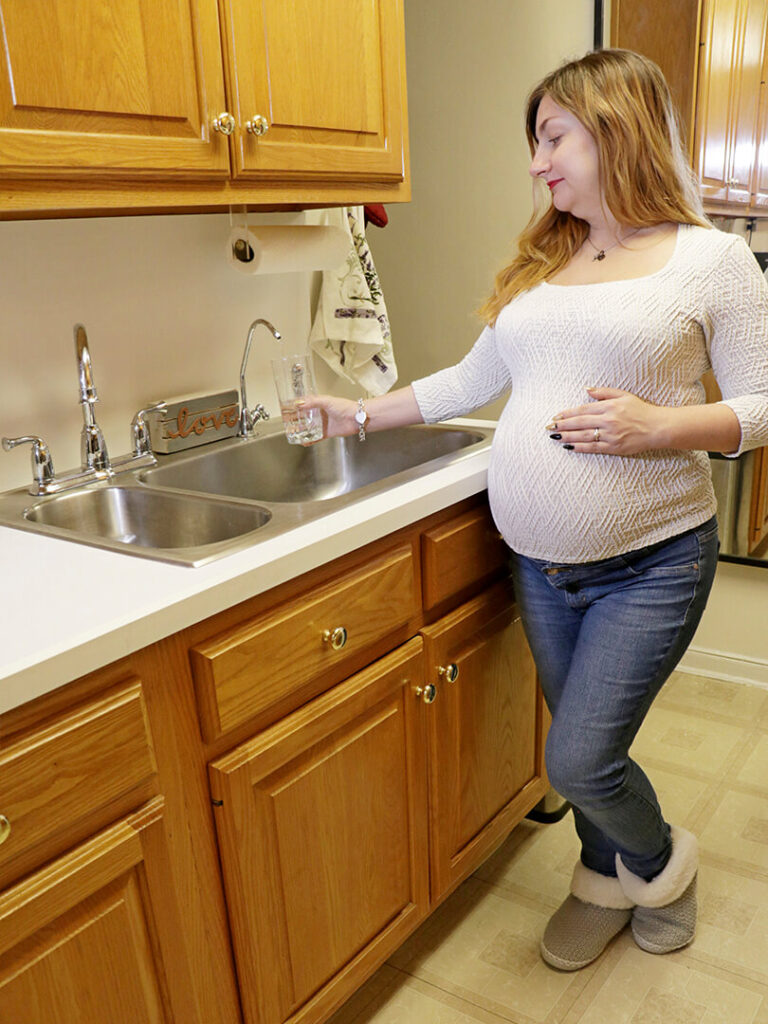
It is not a precise science, but the American College of Obstetricians and Gynecologists (ACOG) and the Institute of Medicine suggest that pregnant women consume on average around 10 8-ounce glasses of water or other liquids in a day.
Whether you’re hiking, going to the gym, or just hanging out indoors, your demands might change depending on several factors. When it’s hot out or you’re working up a sweat, for instance, you’re going to want to drink more water than normal. The best indicator of whether or not you’re consuming enough water is: You should only feel thirsty periodically, and your urine should be a clear or very light yellow in hue.
Although water is best, other beverages such as milk, juice, coffee, and tea can also contribute to your daily fluid needs. Watermelon, cucumbers, and even iceberg lettuce are all examples of high-water-content fruits and vegetables that contribute to healthy water consumption. You shouldn’t rely too much on juice because of the sugar and additional calories it contains. Caffeine, which may be found in beverages such as coffee, tea, and soda, should be consumed in moderation. Pregnant women should not consume more than 200 mg of caffeine per day (the equivalent of around one 12-ounce cup of coffee).
Water Need During First Trimester

Even while you’ll need to pay more attention to your water intake later in pregnancy, you might not have to worry about it too much earlier on. However, if you have morning sickness and end up throwing up, you should be very mindful of how much water you consume. When you throw up, your body loses water and electrolytes, so it’s important to replace them promptly by drinking lots of fluids.
Also, tell your doctor if you’re losing more than 5% of your pre-pregnancy weight because you can’t keep fluids down. Possible causes include hyperemesis gravidarum, which calls for hospitalization and intravenous fluid and electrolyte infusions.
Water Need During Second Trimester,
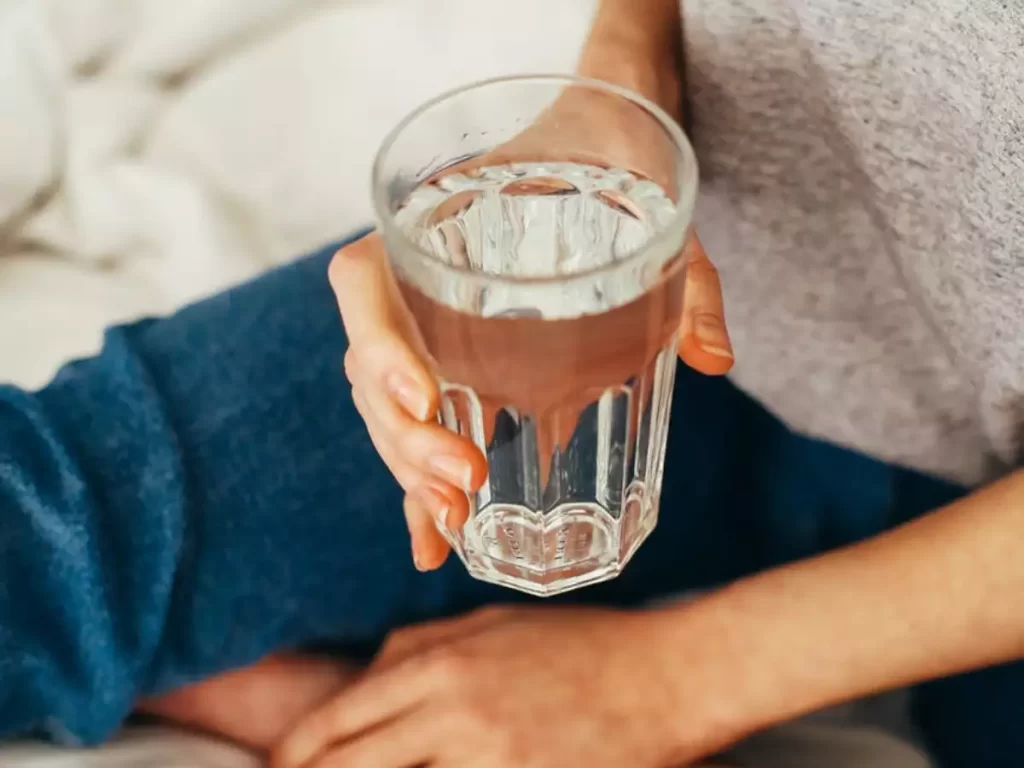
After the first trimester, most women report feeling much better and can eat and drink normally again. However, as blood is composed of more than 75% water, an increase in blood volume also raises the body’s need for water.
An ambitious goal like drinking 10 cups of water may seem impossible, but it’s quite achievable if you spread out your intake rather than guzzling it all at once when you’re parched (and possibly already a bit dehydrated). If you’re not a fan of water’s flavor, you can always add a squeeze of citrus juice or a lemon or lime slice.
Water Need During Third Trimester
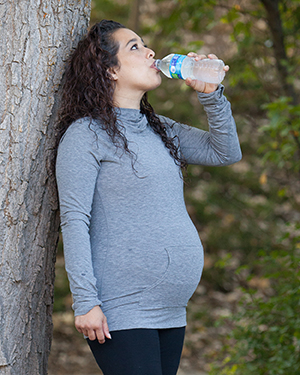
The maximum increase in blood volume occurs between weeks 32 and 34 of pregnancy when it rises by around 50% to 60% over its levels before conception. Because of the similarity between Braxton Hicks contractions and true labor contractions, staying hydrated throughout the third trimester is crucial.
Don’t worry too much about keeping track of how much water you drink, but do keep a bottle handy and start sipping before you start to feel parched.
Factors Determining Water Consumption During Pregnancy
Several additional factors influence how much water a pregnant woman is advised to drink.
Body Weight
One ounce of water is required for every two pounds of body weight. Your water consumption should reflect the fact that you will gain an additional 20-30 pounds from your expanding baby.
Temperature
Sweating is the body’s natural response to high temperatures and serves to cool us down. As temperatures rise, so does our perspiration. Every hour you’re out in temperatures above 70 degrees drink an extra eight ounces of water.
Exercise
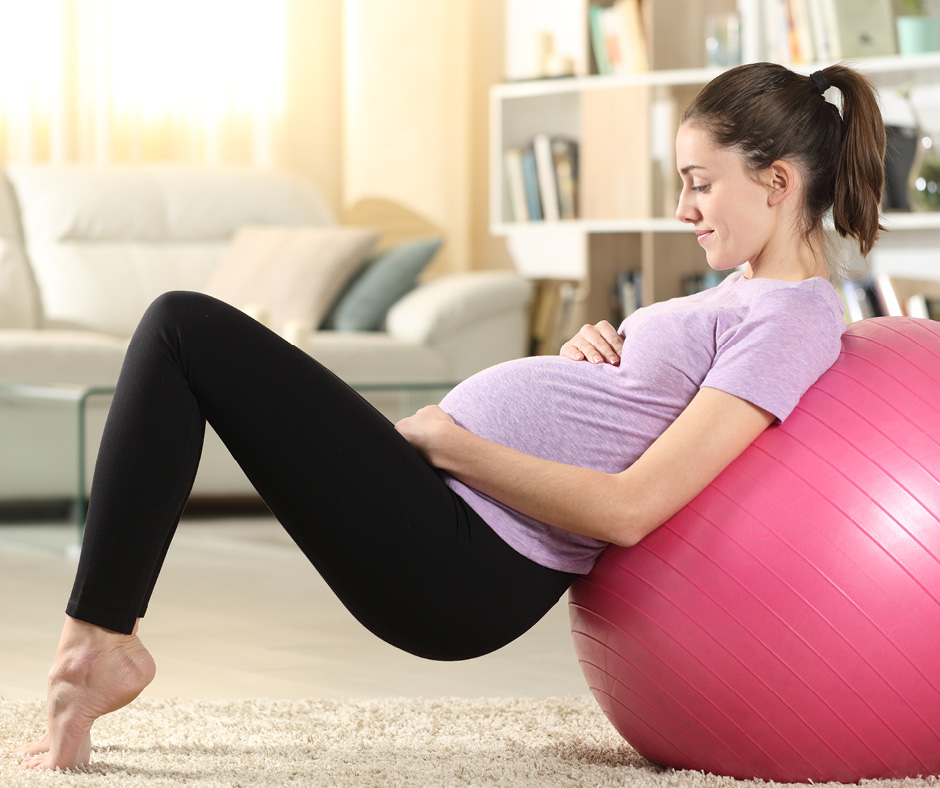
Depends on how active you are; when you work out, your body needs more water to maintain properly hydrated muscles. For every hour of exercise you do while pregnant, drink an extra eight ounces of water.
Tip About: how much water should I drink while pregnant calculator
If you’re going to be exercising or spending time outside on a hot day, make sure you drink before, during, and afterward. In addition, keep in mind that thirst is a warning indicator that your body is on the verge of dehydration.
Which other drinks are safe for pregnant ladies to consume?
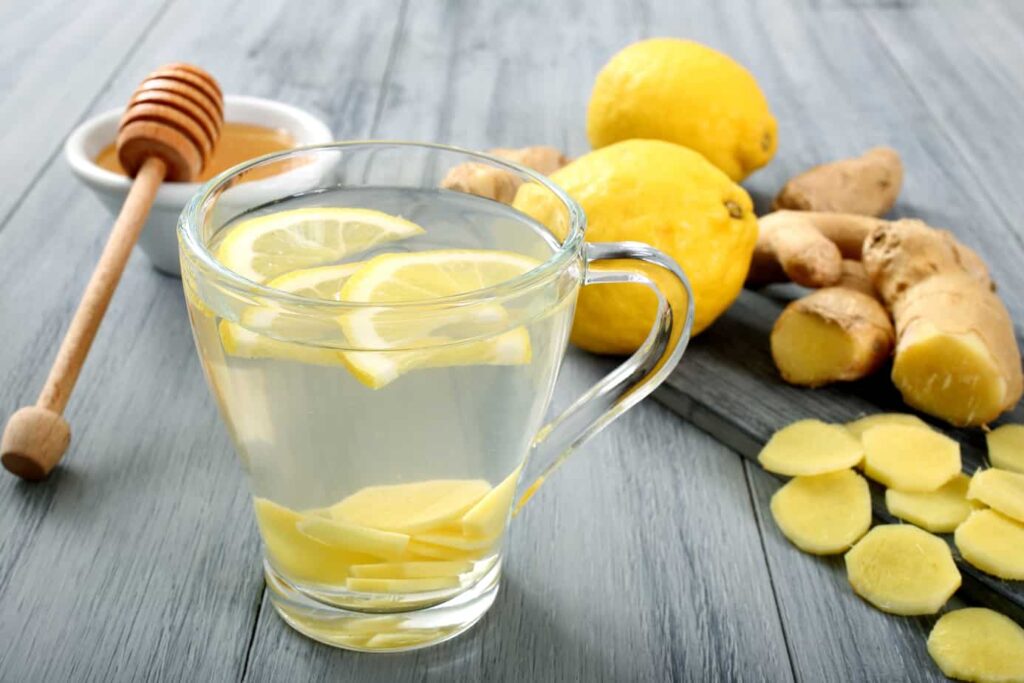
Even though water is the healthiest beverage option, what happens after you’ve had enough? Other beverages that pass muster are plentiful:
- Milk (an 8-ounce glass of skimmed milk yields just over 7 ounces of water)
- Waters with fruit flavors
- Vegetable and fruit juices (watch out for added sugar in fruit juice and added sodium in veggie drinks)
- Caffeine-free tisanes
- Soda (empty calories) and other caffeinated drinks should be used in moderation due to their diuretic effects (besides the other reasons to cut back on caffeine during pregnancy).
What are the dehydration causes during pregnancy?
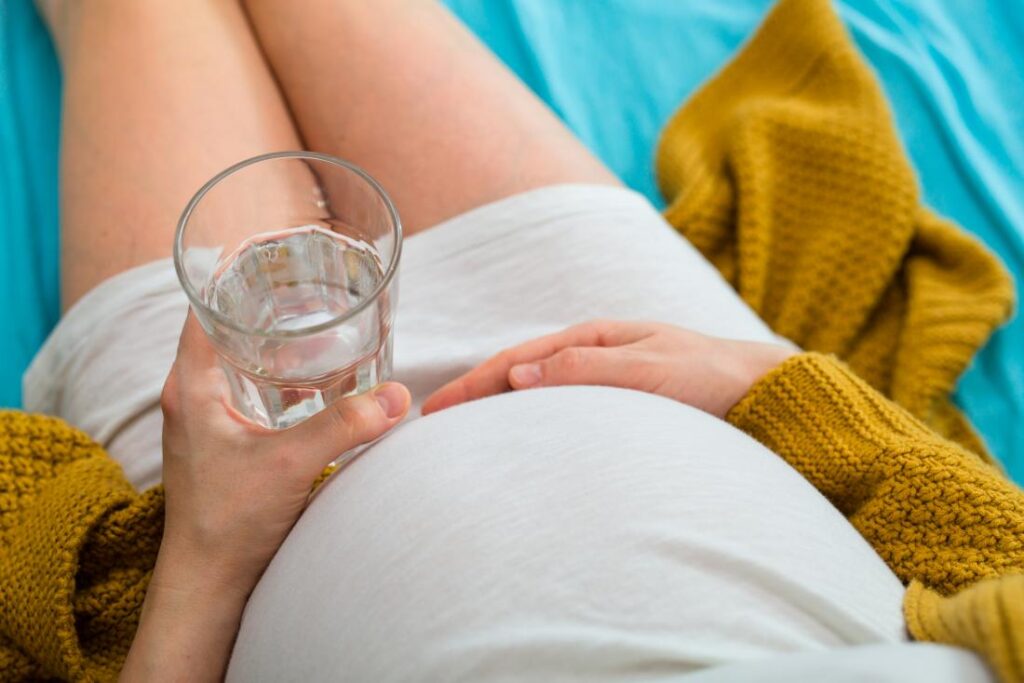
While pregnant, dehydration can occur from several different causes.
One of the most common reasons for dehydration in early pregnancy is the woman’s increased blood volume, which typically rises by around 50%.
- Dizziness, nausea, and vomiting are all symptoms of morning sickness, which affects around half of pregnant women and can cause significant water loss. It’s important to stay hydrated, even if nausea and vomiting have you cutting back on fluids.
- The creation of amniotic fluid facilitates the fetus’s freedom of mobility and growth. More water is needed to make this fluid.
- Sweating a lot – Pregnant women often perspire more than usual. They risk dehydration if they don’t replenish the fluids they’ve lost.
- Pregnant women, especially in their third trimester, often have diarrhea, which is accompanied by significant fluid loss.
What are the signs of dehydration in pregnant women?
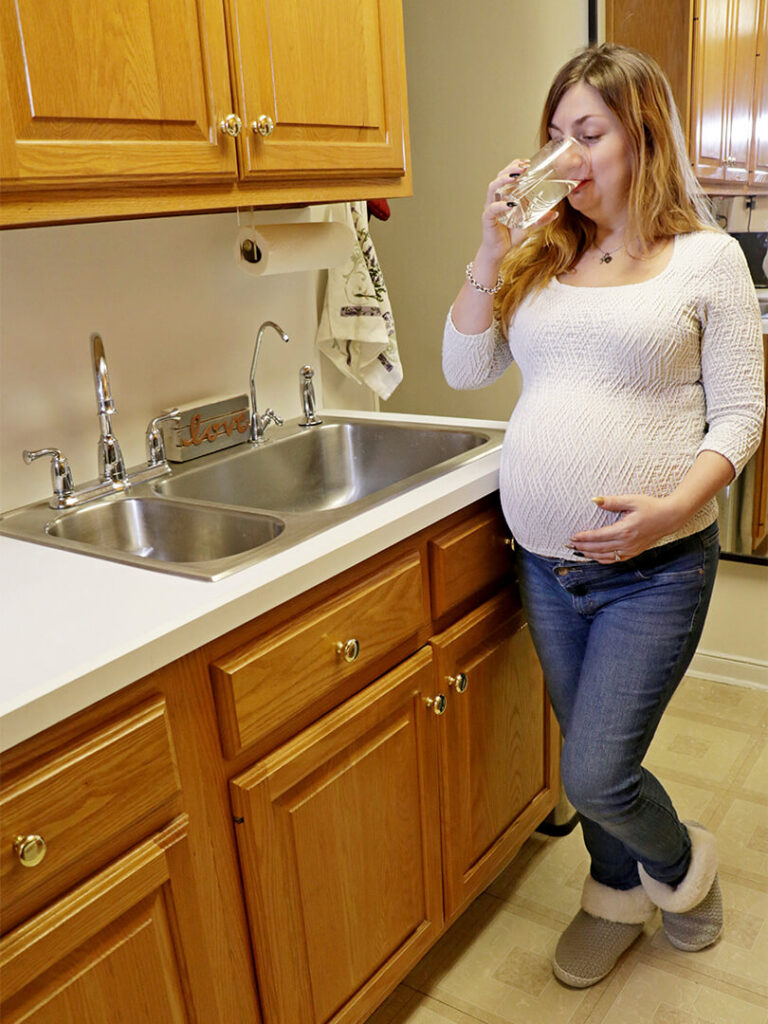
Dehydration’s after-effects range from mild to severe, depending on how much water was lost and why. If you experience any of the following symptoms, you must increase your water intake immediately.
- Dry, cracked lips
- Tiredness
- Elevated thirst
- Anxiety
- Elevated heart rate
- Less frequent need to go to the bathroom
- Yellowish-brown pee
- Dizziness
- Headaches
- Nausea
- Constipation
FAQ: how much water should I drink while pregnant calculator

When pregnant, what happens if you don’t drink enough water?
Neural tube anomalies, low amniotic fluid, insufficient breast milk supply, and early delivery are just some of the significant pregnancy issues that can result from dehydration. These dangers might cause further complications during pregnancy, such as insufficient hydration and nutrients, which can manifest as birth abnormalities.
When pregnant, is it possible to ingest too much water?
Constantly sipping water throughout the day is typically out of the question if you suffer from morning sickness, acid reflux, or have a tiny bladder. Water intoxication can occur in women if they consume too much water too quickly. When this happens, internal water intake exceeds the rate at which waste is eliminated.
Final Words: How much water should i drink while pregnant calculator

In this article, we will discuss how much water should i drink while pregnant calculator. During pregnancy, you’ll need to drink extra water to keep your body functioning properly for two people. In general, adults should drink eight to ten 8-ounce glasses of water (from all sources) each day, while the exact amount depends on factors such as size, level of physical activity, and climate. If you want to find out what works best for you and your condition, though, see a medical professional.
If you want to avoid feeling bloated, it’s best to drink slowly throughout the day rather than guzzle it all at once. If you’re like most people and don’t drink enough water during the day, filling up a couple of water bottles in the morning and having them close by can make staying hydrated much less of a bother.
Also Read: Water Softener Size Calculator